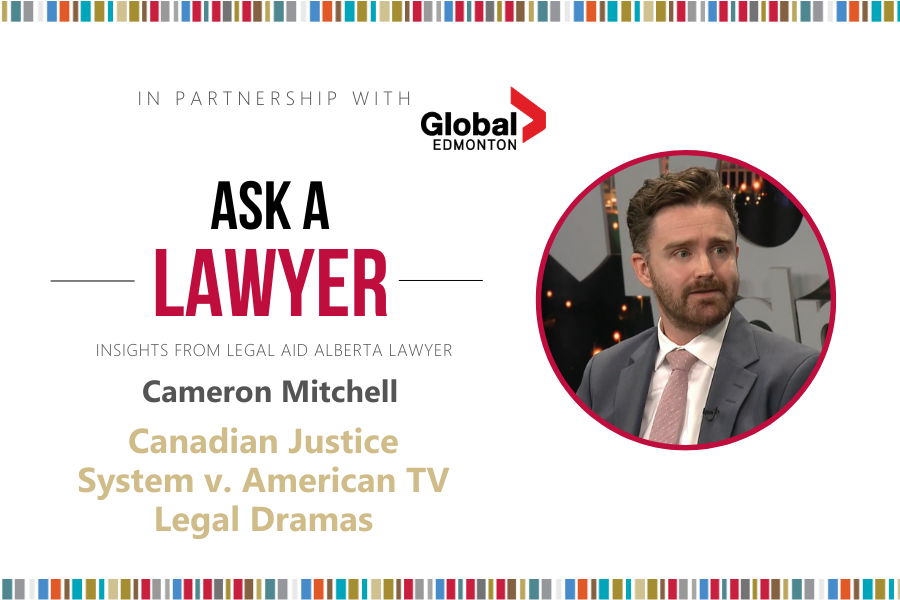Legal Aid Alberta staff lawyer Cameron Mitchell addresses common misconceptions about our justice system and how our courts work
The allure of American legal dramas on TV like Law & Order and Suits often portray a day in the life of a lawyer with gripping courtroom showdowns and dramatic plot twists – but have you ever wondered just how accurately these shows portray the realities of lawyering in Canada?
Legal Aid Alberta staff lawyer Cameron Mitchell joined Global News Morning Edmonton on this month’s segment of Ask a Lawyer to shed light on common misconceptions about Canada’s justice system, the stark differences between the U.S. and Canada, especially as it compares to what we see in American movies, TV shows and read in the American news outlets.
Please view the video on Microsoft Edge web browser.
Transcript of the program:
Vinesh Pratap: Well, there are some professions that get a lot of attention in popular culture, and lawyers are among them. Because so many of these books, movies, TV shows are in America though where their legal system is different than ours, it can create some misconceptions about our justice system. Here today to clear up some of that confusion is Legal Aid Alberta Criminal Duty Counsel Cameron Mitchell. Cameron, thanks so much for your time.
Cameron Mitchell: Hey, thanks for having me.
Vinesh: Let’s start with the term “Criminal Duty Counsel” we use here in Canada. What’s that all about, what do you do?
Cameron: As a criminal duty counsel, I spend most of my working life in a courtroom – I help people charged criminally early on: I do things like bail hearings, guilty pleas, but I also help people navigate the system, so I answer a ton of questions, and I deal with misconceptions all the time.
Vinesh: Let’s talk about some of those misconceptions. You see this a lot in American lawyer dramas, can a complainant in a case drop criminal charges against them [accused]?
Cameron: Yeah, that’s one that we get a lot and yes, from the U.S., because down there it’s quite common for different charges where it’s actually the complainant that will lay the charges and choose whether or not to proceed.
Here, that’s not the way it works. It’s up to the police, they’ll be the ones to lay the charges, and then the Crown will decide whether or not to proceed. They’re going to look at look at things like: “Is this complainant co-operating?” That will be part of their analysis in whether or not to drop the charges, but at the end of the day they don’t have to, and that’s just one factor in their analysis.
Vinesh: So that’s where we differ from what we see on the TV. What about the term “plea bargain”? We hear that a lot on TV as well.
Cameron: Yeah, again, a term from the United States. Here, the closest thing we have is what is called a joint submission. That’s when a defence lawyer and a Crown prosecutor are going to work out a deal for a guilty plea and a sentence – that’s then put to the Justice. Usually they are accepted, but the Justice can still say “no way.” They can bounce it if it’s contrary to public interest.
Vinesh: Other terms we hear on TV or in the movies – felony, misdemeanour, is there a difference? Is one more serious than the other?
Cameron: Again, felony, misdemeanour are U.S. terms. Here we have summary offences and indictable offences. Summary offences are less serious, indictable is more serious, like murder is an indictable offence. But honestly, at the end of the day, the majority of charges in the Criminal Code are not specified if they are summary or indictable. Again, it’s up to the Crown prosecutor. They choose how to proceed.
Vinesh: A term I want to ask you about, and we hear about it not only on TV and movies, but most recently in the States with the charges against former U.S. President Donald Trump: grand jury. We don’t have grand juries in Canada, so what’s the difference between what they do in the States versus what we do up here?
Cameron: So grand jury – that doesn’t exist. What a grand jury is, that’s like a pre-charging sort of screening that they have down in the United States. Here we don’t have that, again it’s all sort of in the hands of, originally, the police and then the Crown. So, the police will give the Crown the case. They’re going to take a look at it and decide “Hey, do we have enough evidence here to proceed? Is there a reasonable likelihood of conviction, is there a public interest?” And it comes down to them. But there is not that sort of initial grand jury screening process.
Vinesh: So, would the equivalent essentially be that what’s called a preliminary inquiry then?
Cameron: So, a preliminary inquiry is a little bit different. So that’s after somebody has already been charged, and then if it’s an indictable matter, then the accused person can elect to have a preliminary inquiry or “prelim”, and that’s sort of a mini-trial before a trial to get all the evidence out. Usually, those end up going to trial, but at that stage, if there’s not enough evidence, then the Crown can choose to withdraw the charges or the justice can dismiss it.
Vinesh: As you deal with clients and people in general, do you find yourself being a bit of a teacher explaining all these terms?
Cameron: A lot. Yeah, especially as a duty counsel. Because every single morning I have no idea how my day is going to go, who I am going to talk to – so I talk to a lot of people from a lot of different walks of life, and I end up answering a ton of different questions.
Vinesh: And if people want more information, just in general, where can they find it?
Cameron: Sure! You can go to the Legal Aid website, that’s a great place to start, it’s actually our 50th anniversary, so we have some exciting webinars coming up, so you can go to the about events section of the website and get more information on all of that.
Vinesh: Well, thank you so much for coming in and clearing up the confusion, and for the work you do at Legal Aid Alberta, it’s greatly appreciated.
Cameron: Thank you for having me.
Vinesh: Legal Aid Alberta lawyers specialize in family law, child welfare, domestic violence, immigration, and youth and adult criminal defence. If you have a question for a lawyer, you can send it to: [email protected].
Legal Aid Alberta is marking its 50th anniversary with a year-long celebration dedicated to honouring our past and energizing for the future. Legal Aid Alberta’s 50th anniversary website captures our journey over the five decades and showcases our impact on the community. Join the celebration and register for our free webinars, delve into the LAA archives or share a social media post to spread the word.


